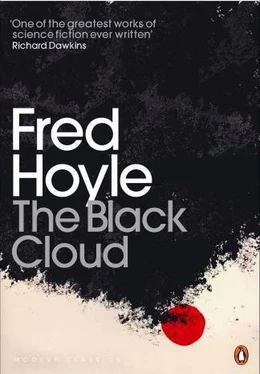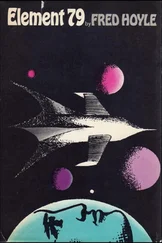Fred Hoyle - The Black Cloud
Здесь есть возможность читать онлайн «Fred Hoyle - The Black Cloud» весь текст электронной книги совершенно бесплатно (целиком полную версию без сокращений). В некоторых случаях можно слушать аудио, скачать через торрент в формате fb2 и присутствует краткое содержание. Жанр: Фантастика и фэнтези, на английском языке. Описание произведения, (предисловие) а так же отзывы посетителей доступны на портале библиотеки ЛибКат.
- Название:The Black Cloud
- Автор:
- Жанр:
- Год:неизвестен
- ISBN:нет данных
- Рейтинг книги:5 / 5. Голосов: 1
-
Избранное:Добавить в избранное
- Отзывы:
-
Ваша оценка:
- 100
- 1
- 2
- 3
- 4
- 5
The Black Cloud: краткое содержание, описание и аннотация
Предлагаем к чтению аннотацию, описание, краткое содержание или предисловие (зависит от того, что написал сам автор книги «The Black Cloud»). Если вы не нашли необходимую информацию о книге — напишите в комментариях, мы постараемся отыскать её.
The Black Cloud — читать онлайн бесплатно полную книгу (весь текст) целиком
Ниже представлен текст книги, разбитый по страницам. Система сохранения места последней прочитанной страницы, позволяет с удобством читать онлайн бесплатно книгу «The Black Cloud», без необходимости каждый раз заново искать на чём Вы остановились. Поставьте закладку, и сможете в любой момент перейти на страницу, на которой закончили чтение.
Интервал:
Закладка:
“Bloody bad science,” growled Alexandrov. “Correlations obtained after experiments done is bloody bad. Only prediction in science.”
“I don’t follow.”
“What Alexis means is that only predictions really count in science,” explained Weichart. “That’s the way Kingsley downed me an hour or two ago. It’s no good doing a lot of experiments first and then discovering a lot of correlations afterwards, not unless the correlations can be used for making new predictions. Otherwise it’s like betting on a race after it’s been run.”
“Kingsley’s ideas have many very interesting neurological implications,” McNeil remarked. “Communication for us is a matter of extreme difficulty. We ourselves have to make a translation of the electrical activity — essentially D.C. activity — in our brains. To do this, quite a bit of the brain is given over to the control of the lip muscles and of the vocal chords. Even so our translation is very incomplete. We don’t do too badly perhaps in conveying simple ideas, but the conveying of emotions is very difficult. Kingsley’s little beasts could, I suppose, convey emotions too, and that’s another reason why it’s rather meaningless to talk of separate individuals. It’s rather terrifying to realize that everything we’ve been talking about tonight and conveying so inadequately from one to another could be communicated with vastly greater precision and understanding among Kingsley’s little beasts in about a hundredth of a second.”
“I’d like to follow the idea of separate individuals a little further,” said Barnett, turning to Kingsley. “Would you think of each individual in the Cloud as building a radiative transmitter of some sort?”
“Not as building a transmitter. Let me describe how I see biological evolution taking place within the Cloud. At an early stage I think there would be a whole lot of more or less separate disconnected individuals. Then communication would develop, not by a deliberate inorganic building of a means of radiative transmission, but through a slow biological development. The individuals would develop a means of radiative transmission as a biological organ, rather as we have developed a mouth, tongue, lips, and vocal chords. Communication would improve to a degree that we can scarcely contemplate. A thought would no sooner be thought than it would be communicated. An emotion would no sooner be experienced than it would be shared. With this would come a submergence of the individual and an evolution into a coherent whole. The beast, as I visualize it, need not be located in a particular place in the Cloud. Its different parts may be spread through the Cloud, but I regard it as a neurological unity, interlocked by a communication system in which signals are transmitted back and forth at a speed of 186,000 miles a second.”
“We ought to get down to considering those signals more closely. I suppose they’d have to have a longish wave-length. Ordinary light presumably would be useless since the Cloud is opaque to it,” said Leicester.
“My guess is that the signals are radio waves,” went on Kingsley. “There’s a good reason why it should be so. To be really efficient one must have complete phase control in a communication system. This can be done with radio waves, but not, so far as we know, with shorter wave-lengths.”
McNeil was excited.
“Our radio transmissions!’ he exclaimed. “They’d have interfered with the beast’s neurological control.”
“They would if they’d been allowed to.”
“What d’you mean, Chris?”
“Well, the beast hasn’t only to contend with our transmissions, but with the whole welter of cosmic radio waves. From all quarters of the Universe there’d be radio waves interfering with its neurological activity unless it had developed some form of protection.”
“What sort of protection have you in mind?”
“Electrical discharges in the outer part of the Cloud causing sufficient ionization to prevent the entry of external radio waves. Such a protection would be as essential as the skull is to the human brain.”
Aniseed smoke was rapidly filling the room. Marlowe suddenly found his pipe too hot to hold and put it down gingerly.
“My God, you think this explains the rise of ionization in the atmosphere, when we switch on our transmitters?”
“That’s the general idea. We were talking earlier on about a feedback mechanism. That, I imagine, is just what the beast has got. If any external waves get in too deeply, then up go the voltages and away go the discharges until the waves can get in no farther.”
“But the ionization takes place in our own atmosphere.”
“For this purpose I think we can regard our atmosphere as a part of the Cloud. We know from the shimmering of the night sky that gas extends all the way from the Earth to the denser parts of the Cloud, the disk-like parts. In short we’re inside the Cloud, electronically speaking. That, I think, explains our communication troubles. At an earlier stage, when we were outside the Cloud, the beast didn’t protect itself by ionizing our atmosphere, but through its outer electronic shield. But once we got inside the shield the discharges began to occur in our own atmosphere. The beast has been boxing-in our transmissions.”
“Very fine reasoning, Chris,” said Marlowe.
“Hellish fine,” nodded Alexandrov.
“How about the one-centimetre transmissions? They went through all right,” Weichart objected.
“Although the chain of reasoning is getting rather long there’s a suggestion that one can make on that. I think it’s worth making because it suggests the next action we might take. It seems to me most unlikely that this Cloud is unique. Nature doesn’t work in unique examples. So let’s suppose there are lots of these beasts inhabiting the Galaxy. Then I would expect communication to occur between one cloud and another. This would imply that some wave-lengths would be required for external communication purposes, wave-lengths that could penetrate into the Cloud and would do no neurological harm.”
“And you think one centimetre may be such a wave-length?”
“That’s the general idea.”
“But then why was there no reply to our one-centimetre transmission?’ asked Parkinson.
“Perhaps because we sent no message. There’d be no point in replying to a perfectly blank transmission.”
“Then we ought to start sending pulsed messages on the one centimetre,” exclaimed Leicester. “But how can we expect the Cloud to decipher them?”
“That’s not an urgent problem to begin with. It will be obvious that our transmissions contain information — that will be clear from the frequent repetition of various patterns. As soon as the Cloud realizes that our transmissions have intelligent control behind them I think we can expect some sort of reply. How long will it take to get started, Harry? You’re not in a position to modulate the one centimetre yet, are you?”
“No, but we can be in a couple of days, if we work night shifts. I had a sort of presentiment that I wasn’t going to see my bed tonight. Come on, chaps, let’s get started.”
Leicester stood up, stretched himself, and ambled out. The meeting broke up. Kingsley took Parkinson on one side.
“Look, Parkinson,” he said, “there’s no need to go gabbling about this until we know more about it.”
“Of course not. The Prime Minister suspects I’m off my head as it is.”
“There is one thing that you might pass on, though. If London, Washington, and the rest of the political circus could get ten-centimetre transmitters working, it’s just possible that they might avoid the fadeout trouble.”
When Kingsley and Ann Halsey were alone later that night, Ann remarked:
Читать дальшеИнтервал:
Закладка:
Похожие книги на «The Black Cloud»
Представляем Вашему вниманию похожие книги на «The Black Cloud» списком для выбора. Мы отобрали схожую по названию и смыслу литературу в надежде предоставить читателям больше вариантов отыскать новые, интересные, ещё непрочитанные произведения.
Обсуждение, отзывы о книге «The Black Cloud» и просто собственные мнения читателей. Оставьте ваши комментарии, напишите, что Вы думаете о произведении, его смысле или главных героях. Укажите что конкретно понравилось, а что нет, и почему Вы так считаете.












